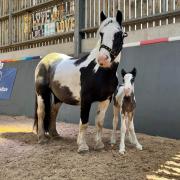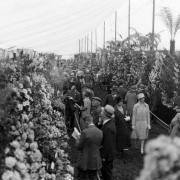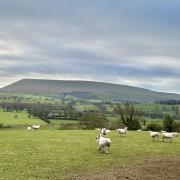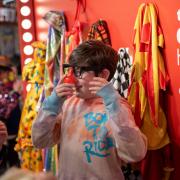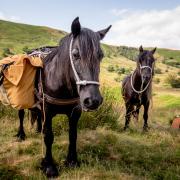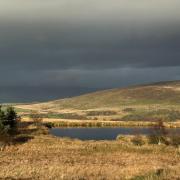Badapple is a professional company that happens to tour on a smaller scale, as Tony Greenway discovers

Over the last eight years, director and playwright Kate Bramley has set herself an interesting challenge. If people can’t get to the theatre — because it’s too expensive, or too far away — then she brings the theatre to them. Basically, show Kate and her team a church or a village hall and they’ll say: ‘Let’s do the show right here!’
Sounds easy enough? In practice, of course, it’s fiendishly difficult. Yet Kate, who founded York-based Badapple Theatre Company in the late Nineties (no prizes for guessing how she dreamt up the name), is on a mission to bring ‘quality drama, music and comedy to small halls and local theatres’ and give a good night out to local audiences who would otherwise have to drive into town. And she isn’t going to let little things like complicated logistics and a limited budget get in her way. Badapple has christened this type of performance, ‘Theatre on Your Doorstep’.
Take the company’s new production of The Daily Bread (a one-man show it originally premiered in 2014). In February and March it will be touring around a variety of tiny venues across the county, including Askham Bryan Village Hall, Ampleforth Village Hall, Campsall Village Hall, Lockington Village Hall and Tockwith Village Hall. Audiences of Badapple productions don’t go to these venues expecting West End-style pyrotechnics and a cast of hundreds — there really isn’t the room or the budget — but they do prepare themselves for a great, intimate, original night out at the theatre.
That’s because Badapple is a professional company that just happens to tour on a smaller scale. Kate, who writes the scripts and directs the shows, was an assistant director at Hull Truck, training with John Godber (‘a big influence on me,’ she says) and the actors in her touring band are the same ones you’ll see at your regional repertory theatre. Robert Angell, who has appeared on TV in Waterloo Road, among others, is a case in point. ‘Rob was in the Railway Children at the York Railway Museum over the summer,’ says Kate. ‘That was a massive production with a mammoth amount of money, great reviews and heavy hitting actors. And he walked straight out of that to go on tour with us (in a show called The Carlton Colliers). So we’re really lucky to have found a group of actors who are excellent at what they do and understand what we are trying to achieve.’

And that can best be summed up as community cohesion. Kate knows what it’s like to live miles away from the nearest theatre. As a child, she was brought up in an out-of-the-way spot and remembers the price she’d pay for going to meet friends at an arts centre or the theatre for the evening. ‘I had an hour’s walk home afterwards,’ she says. ‘It’s hard for people to make the commitment to anything artistic if it’s difficult to access. But when we come to their community they can have a drink, catch up with friends and neighbours and enjoy an artistic experience together. Then I’m sure, as we leave, they report back to everyone in the pub about how the show was and if it was better than the last one we did.’
When Badapple turn up at your local village hall, they’ll have their stage with them, designed to the spec of their van and trailer. There is, however, a limit when it comes to the number of performers on the cast list. ‘When we started the move into village halls we were able to afford one actor,’ remembers Kate. ‘Still, we made it a complete theatre experience.’
Thanks to Arts Council support, Badapple was able to take three actors out on tour with The Carlton Colliers. ‘I can’t be Alan Ayckbourn and write for a cast of eight,’ admits Kate. ‘But I don’t need to. Those three actors can play any number of characters; and they can be supplemented by video or puppetry or animation. For example, in our Christmas show, we had an actor playing Ebenezer Scrooge who also played a puppet version of himself at the same time.’ She pauses. ‘That sounds bonkers. It is bonkers. But we’re pushing the bounds of what we can do.’
Support from Arts Council funding, she admits, can’t be taken for granted in these cash-strapped days. ‘The Arts Council has been very supportive towards us,’ she says, ‘but by no means has everything we’ve applied for been successful. It’s the nature of the wider financial environment we find ourselves in. They have to make very careful choices.’

Audiences are different everywhere Badapple goes. ‘Some are quietly enthusiastic,’ she says. ‘Some are stony in a very Yorkshire way but then tell you how much they’ve enjoyed it at the end. Some are crazed!’ The Badapple crowd have many favourite small venues for different reasons. ‘There’s a great space we play at Hunsingore: a supper club with some of the most riotous people we’ve ever met,’ says Kate. ‘They’re wonderful. And on the extreme of the North York Moors, at Fylingdales, we’ve built up an audience from scratch. We often go there out of season and the local community has really got behind us. Yes, what we do is small scale because it has to fit into the smallest of venues. But it’s live. It’s happening in front of you. And people get very excited about live storytelling.’
Not everyone in theatre world understands why Kate and Badapple have chosen to go small scale, however. ‘Some of my colleagues have asked why we moved out of national touring, to mid-scale and then to very small venues. They say: “You’ve gone off piste. What are you doing?” But for me, there’s a much stronger connection to the audience. We’ve had stronger audiences in village halls in the middle of nowhere than we’ve had in some arts centres and theatres. People enjoy the access, especially older people and young families, who like walking down the road to their village hall. And our prices are significantly lower than the regional repertory theatres.’
Often when they experience a Badapple show, Kate’s theatrical peers get it. ‘Until that point,’ she says, ‘I think there are still some within the wider theatre world who have reservations about (creating theatre on) this sort of scale.’
Does she mean there’s a snobbery some theatre types have about playing small venues? ‘I think so, yes,’ she says cheerfully. ‘It’s hard for me to be objective because this is where I’ve based my career and it’s so woven into the style of shows I produce that it’s very natural to me. Someone did say to me fairly recently: “Well, there’s not much money in it, is there?” And, no, not in terms of having a 500-seat theatre, there isn’t. We’re not going to turnover a lot of profit. But it’s about community more than is it about profit...’ w
Find out where Badapple are performing next at badappletheatrecompany.com




